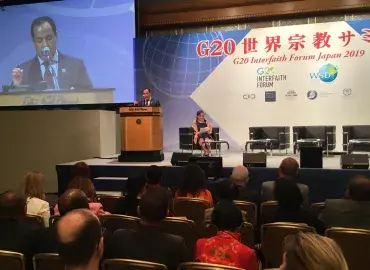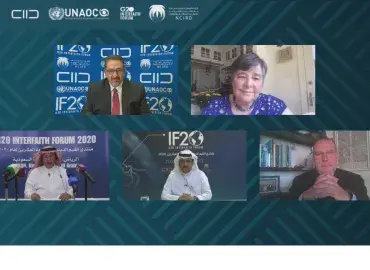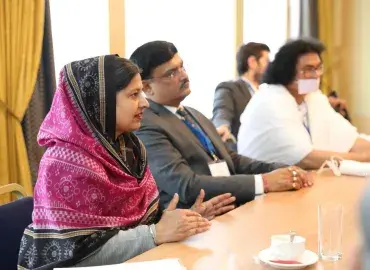
2015 G20 INTERFAITH SUMMIT:
Religion, Harmony and Sustainable Development
H.E. Metropolitan Emmanuel of France
Istanbul, Turkey, November 16 2015
Excellences,
Eminences,
Esteemed Dignitaries,
Distinguished Participants,
Honored Guests,
Ladies and Gentlemen,
Dear Friends,
On behalf of the Ecumenical Patriarchate, and of the KAICIID Dialogue Center, I would like to congratulate you on the occasion of the 2015 G20 Interfait Summit. I congratulate all the participants, religious and political leaders, as well as academics for their strong commitment in favor of peace, justice and dialogue.
It is impossible to speak about religion, harmony and sustainable development without sharing a common understanding of human dignity. As witnesses of a world in crisis, we need to rediscover the meaning of faith. Some blame globalization. But behind this phenomenon, mankind should face its own responsibilities, as interrelated people, or as I would say, as people bonded by a relationship with the whole creation.
Ethics and sustainable development constitute issues that are considered as part of the global crisis. Can we, however, also consider them as challenges that pertain to justice and responsibility? Of course, the word "crisis" has its own face value. In Greek, it means "judgment," and it is true that these issues point to the negative consequences of our system and challenge our lifestyle. Speaking of a challenge means to be invited to think further and to act! It means to recognize the problem by seeking a solution. A challenge calls out for a solution, stimulates, puts things in motion. How then can we think of sustainable development as a challenge pertaining to justice and responsibility?
The challenge is not just (geo-)political, economic and philosophical. We can recognize a spiritual challenge as well. Are we not misled by seeing ourselves as masters and possessors of nature, a nature that has the sole and only purpose to serve us? According to the Scripture, we confess the world as God's creation, in which thrives life and one can sense the divine (Gen 1.1 to 2.25). We therefore believe that we constitute an integral part of this good creation and recognize that the destinies of nature and humanity are intimately interrelated. In this regard, the biblical texts teach us that God has given us the "faithful and prudent" (Lk. 12,42) stewardship of creation. To protect humanity is to protect creation and to protect creation is to protect humanity.
A structural transformation of our lifestyles and consumption patterns cannot be achieved unless all stakeholders commit themselves to this purpose, which means citizens, NGOs, social movements, businesses and communities, as well as church and spiritual movements ... It has to do with questioning one’s self on the appropriateness of each level of decision taking and organization, from the local to the regional, from the national to the international. The evidence of the emergency forces us to develop a new imagination, new alternatives and new forms of commitment: interpellation of policymakers, involvement in local projects, a call for accountability of the political and economic actors, local and communitarian solutions. It has to do with putting politics back in the service of community, but also putting citizens at the center of politics and decision-making mechanisms, with the common good as its main goal and horizon. Faced with this international and globalized crisis, which is exactly what, for instance, the climate crisis is, the religions must renew the Word they transmit: they must remind the world of Fraternity as the essential foundation of an unconditional acceptance, of Justice for the most humble horizon of all forms of solidarity, of Peace for all as a condition for good Life, of Simplicity and Gratitude as seeds of a renewed Hope. In that case, solidarity is identical to harmony.
Ladies and Gentlemen,
In order however, to meet the challenge of sustainable development, we must also take on a spiritual challenge: that of converting lifestyles. The spirit of conversion, in Christian spirituality, calls for an in-depth mutation, for a reversal of the being that touches and exceeds at the same time both the value and the environmental issues. Love for one’s neighbor - present and future - takes over selfishness. The collective action of believers will apply pressure on the world leaders and global decision makers. Sobriety will respond to the appetites of over-consumerism. Sharing limits inequality. Finally, charity encompasses the political and the social sphere. Through prayer and commitment, we can be led to a new life that opens up the future to the possibility of a sustainable, just and peaceful society. As Ecumenical Patriarch Bartholomew would say: “We cannot separate our concern for human dignity, human rights or social justice from concern for ecological protection, preservation and sustainability. These concerns are forged together, comprising an intertwining spiral that can either descend or ascend.”
Thank you for your attention!
A delegation from the International Dialogue Centre (KAICIID) led by the Secretary General, Faisal Bin Muaammar, participating…
The capacity of interfaith dialogue to unite disparate traditions under a common cause, the importance of offering a voice to…
The International Dialogue Centre (KAICIID), together with the United Nations Alliance of…



